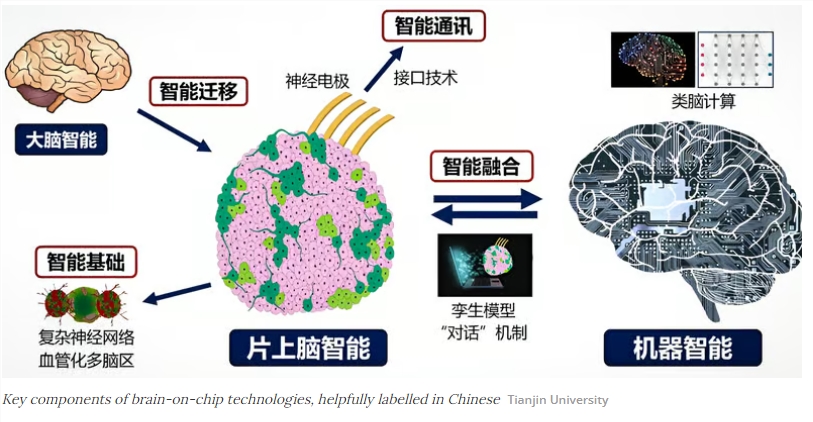The MetaBOC system developed by Tianjin University is the world's first open source brain-on-chip intelligent complex information interaction system, marking a major breakthrough in brain-computer interface technology. The system was jointly developed by the Tianjin University Brain-Computer Interaction and Human-Computer Integration Haihe Laboratory team and Southern University of Science and Technology. Through human brain organoids connected to computer chips, it can control robots to perform complex actions and realize a variety of brain-like computing. Inspiring work. This technology not only opens up new possibilities in the field of brain-computer interface, but also has a profound impact on cutting-edge technological fields such as hybrid intelligence and brain-like computing, triggering people's in-depth thinking on future technological development and ethical issues.
The core of MetaBOC is the "brain-on-a-chip", which combines stem cell culture technology and artificial intelligence algorithms to realize the transformation of cell culture from two-dimensional to three-dimensional and build a more complex neural computing network. However, the rapid development of this technology also brings ethical challenges. For example, whether "brain-on-a-chip" can produce consciousness needs further exploration. In addition, the maintenance of "wetware" components also requires overcoming technical difficulties to ensure their long-term stable operation. This research by the Tianjin University team is a technological breakthrough and a profound exploration of human intelligence. It points out the direction for future technological development and provides a new perspective for us to understand our own intelligence.

The core of this research is the "brain-on-a-chip", which consists of two parts: the "chip" (electrode chip) and the "brain" (cultured brain in vitro). Using stem cell culture technology, a "brain-like tissue" with the intelligent functions of a biological brain is created outside the human body and equipped with electrode chips, allowing scientists to debug it or send signals to the outside to achieve specific functions.
Ming Dong, vice president of Tianjin University, said that unlike traditional technologies that mainly use human brains or other biological brains as experimental subjects, brain-on-a-chip will become an important emerging branch in the field of brain-computer interfaces. The two main breakthroughs of this research are: cell culture has moved from two-dimensional to three-dimensional, providing a more complex neural computing network for the brain-on-chip; and the addition of artificial intelligence algorithms has enabled attempts in the field of hybrid intelligence.
With the rapid development of technology, ethical issues also arise. Will a brain-on-a-chip produce consciousness? Will artificial intelligence produce consciousness? These questions are becoming more and more realistic. At the same time, the maintenance of "wetware" components is also a challenge. It is necessary to maintain their vitality and provide a suitable growth environment.
This research by the Tianjin University team is not only a technological breakthrough, but also a profound exploration of human beings' understanding of their own intelligence. As we move toward the mysterious technological singularity, the day when artificial intelligence surpasses human intelligence may no longer be far away.
Reference: https://newatlas.com/robotics/brain-organoid-robot/
The successful development of the MetaBOC system indicates that brain-computer interface technology is developing in a more intelligent and integrated direction, and is expected to play a greater role in medical, robotics and other fields in the future. However, technological progress also needs to be coordinated with ethical and moral norms to ensure its healthy and sustainable development. We look forward to more similar research results in the future to promote the advancement of human science and technology.